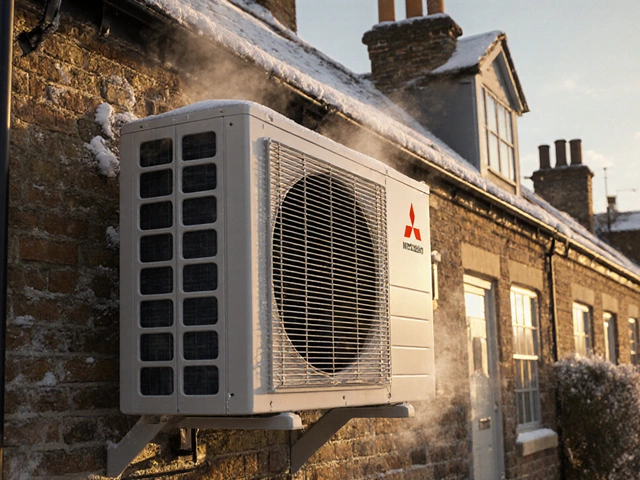Got a boiler that seems to be working harder than it should? You’re not alone. Most homeowners notice a rise in heating costs before they realize the boiler is losing efficiency. The good news is you don’t need a massive overhaul to fix it. A few simple checks and regular upkeep can keep your boiler humming, your home cozy, and your wallet happy.
First thing to watch for is uneven heat. If one room stays cold while others are warm, the boiler might be struggling to distribute water properly. Check the radiators – cold spots on the top usually mean air is trapped inside. A quick bleed can release that air and restore flow. Also, listen for odd noises. Gurgling or banging sounds often signal scale buildup or low water pressure, both of which sap efficiency.
Next, keep an eye on your energy bill. A sudden jump of 15‑20% without any change in usage is a red flag. It could mean the burner is dirty, the thermostat is off, or the heat exchanger is clogged. Take note of the billing period and compare it to the same month last year – seasonal differences are normal, but sharp spikes aren’t.
Don’t forget the obvious: the boiler’s age. Most modern condensing boilers stay efficient for about 10‑15 years if you service them regularly. If yours is older, the technology inside may simply be outdated. In that case, efficiency losses are built‑in, and you’ll likely see higher running costs no matter how well you maintain it.
When you find a problem, the first question is whether it’s worth fixing. Small issues like a faulty pump, a leaking valve, or a dirty heat exchanger usually cost a fraction of a full replacement and can be sorted by a qualified engineer. A quick service visit can clean the internals, adjust the pressure, and recharge the system – often restoring 90‑95% of its original efficiency.
However, if the boiler is repeatedly breaking down, needs major part replacements, or the repair costs exceed 50% of a new unit, think about swapping it out. New condensing boilers are designed to work at lower temperatures and extract more heat from the flue gases, which translates to lower fuel use. The upfront price is higher, but the savings on energy bills usually pay off in 5‑7 years.
Before you decide, get a professional assessment. A Gas Safe registered engineer can run a performance test, check for carbon monoxide leaks, and give you a clear picture of the remaining lifespan. They’ll also advise on the best size for your home – an oversized boiler burns more fuel, while an undersized one runs constantly, both hurting efficiency.
In the meantime, there are a few DIY steps you can take. Flush the system every few years to remove sludge, keep the area around the boiler clear for proper ventilation, and never ignore warning lights on the control panel. Regular servicing (ideally once a year) is the cheapest way to catch problems early and keep the boiler running at peak performance.
Bottom line: an efficient boiler isn’t a magic device – it needs a bit of love to stay efficient. Spot the signs, perform basic maintenance, and call in a qualified pro when the job looks big. With these habits, you’ll enjoy steady heat, lower bills, and fewer surprise breakdowns.

Maintaining a boiler goes beyond just an annual check-up. Regular maintenance ensures that your heating system runs efficiently, prolonging its lifespan and saving money on repairs. This article delves into necessary care tips, signs indicating a need for professional help, and actions homeowners can take to keep their boilers in top shape. Understanding the importance of each maintenance task can help prevent unexpected breakdowns, especially during colder months.

Extractor fans are a lifesaver when it comes to clearing out steam, smoke, and nasty odors, but many people forget they actually need a little love now and then. This article cracks open the question of whether extractor fans need maintenance, and if so, what kind and how often. We'll cover quick tips, warning signs, and busted myths around fan care. Get the straightforward facts (and a few surprises) about keeping your fan working its best. No nonsense, just super practical info you can use right now.

Discover the most reliable heat pump brands for UK homes in 2025, based on real repair data, warranty claims, and installer feedback. Avoid costly mistakes by choosing wisely.

Discover how much boiler service costs in 2025, what affects the price, what's included, and tips to save money while keeping your heating safe and reliable.

If your cooker suddenly stopped working, it might be due to a range of reasons from electrical issues to simple user errors. Understanding the root cause is key to fixing the problem efficiently. In this article, we explore common reasons why cookers fail and offer practical troubleshooting tips to get your appliance working again. From checking the power supply to examining electrical components, we cover it all. Get your cooker back up and running with our straightforward guide.

Is your heat pump not blowing warm air? Here’s what causes it and how you can troubleshoot the issue. Easy fixes and tips for a cozy home.